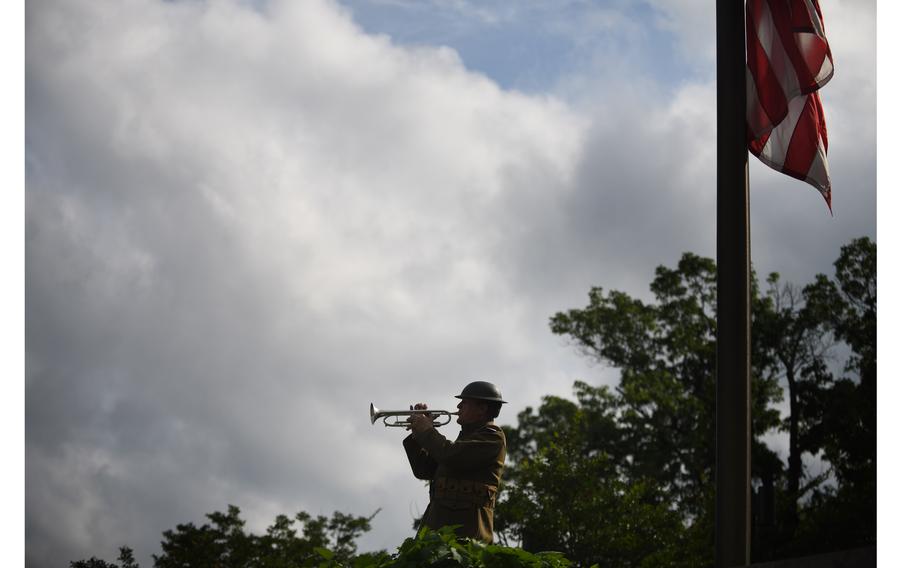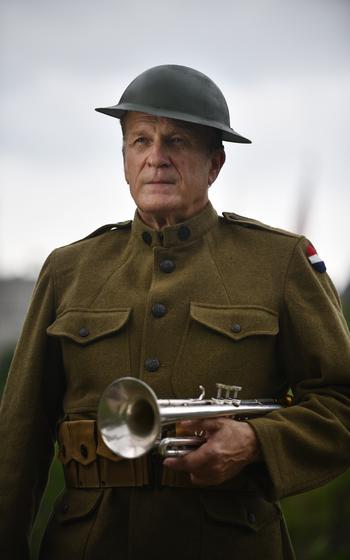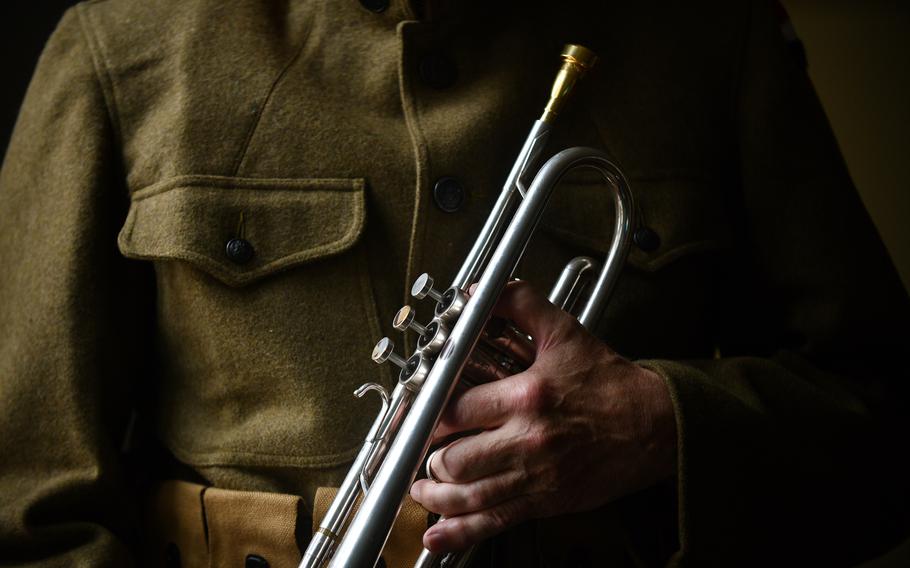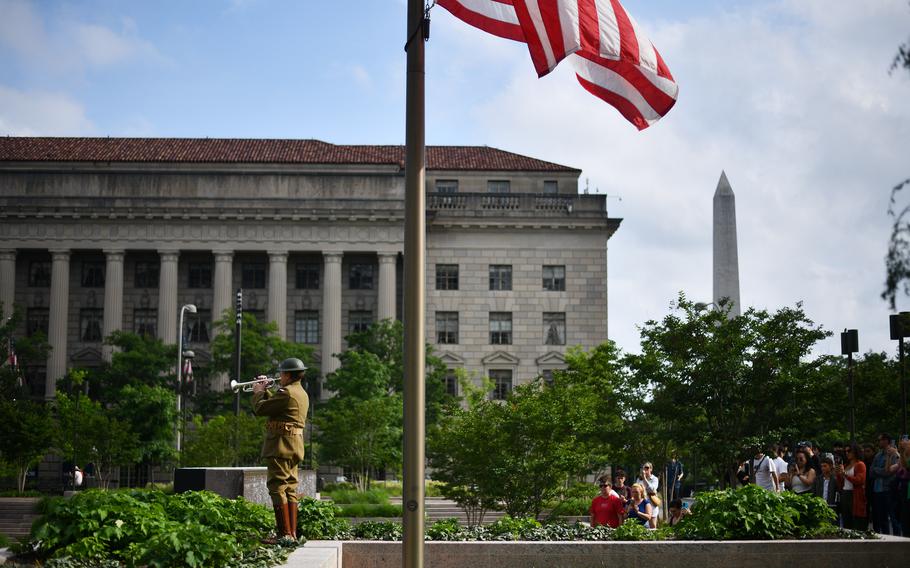
Dressed in a WWI uniform, Chris Gekker plays taps at the World War I Memorial in Washington, D.C. on Monday, May 27, 2024. (Astrid Riecken for The Washington Post)
Chris Gekker stepped up to the flag flying at half-staff, trumpet tucked against a borrowed wool uniform. Before him was the World War I Memorial and its lines of poetry on a granite wall.
We were young, they say. We have died. Remember us.
He raised the mouthpiece, took a pause. Then a breath.
The son and grandson of immigrants who fought for America in two World Wars was about to perform taps — the 24 most solemn and beautiful notes he ever plays.
Gekker has been with this instrument for 62 of his 70 years. He’s recorded with it, taught with it, shared it with his music-loving father before his father was gone too soon.
He thinks of taps as eight groups of three notes each. Fairly simple.
But sometimes, he says, “simple things are not that easy to do.”

Chris Gekker is a professor of trumpet at the University of Maryland School of Music. (Astrid Riecken for The Washington Post)
Taps has a sacred presence in Washington. Its soulful melody can be heard dozens of times a day at Arlington National Cemetery — after the three sharp rifle volleys at military funerals and after wreaths are placed at the Tomb of the Unknowns.
Daily soundings of taps began three years ago at the World War I Memorial, just after the partially completed monument opened to the public. The work will be completed after a 58-foot bronze sculpture is installed, starting in July.
The Doughboy Foundation, a nonprofit group helping operate the memorial, plans to keep buglers and trumpeters performing taps there at 5 p.m. every day in perpetuity. Foundation officials say a bugler has been absent only one day, when a nearby protest in January prevented him from reaching the spot.
By the time Gekker got the call, he had spent decades with the weight of taps.
He played it for families of the victims after terrorists flew a plane into the Pentagon on Sept. 11, 2001. He played it on the edge of a cliff in the Teton mountains for the family of a man who fell to his death nearby. For years, he played it five times each Memorial Day weekend at a Catholic church in Bethesda, seeing the tears of those in the pews when he was done.
It has not become easier.
Music has always been a tool for Gekker to connect — a medium of love, of family, of soaring beauty, a place to find and share humanity, with its moments of joy and sadness.
Gekker’s father, U.S. Army Sgt. Paul Gekker, didn’t talk much about war. He had landed with the Allies in Europe during World War II and marched to Berlin, but he was too thankful to be alive to spend much time looking back.

Chris Gekker has performed with Sting and Peter Gabriel. (Astrid Riecken for The Washington Post)
Gekker first picked up the trumpet in fourth grade. Sometimes his father, an immigrant from Ukraine, would pull his car over so he and his son could listen to the end of a symphony without the distractions of the road. He died when Gekker was 16.
Before Gekker graduated from high school, he played a concerto with the U.S. Navy Band in Constitution Hall. He has performed with Sting and Peter Gabriel, been on the soundtrack of a Samuel L. Jackson sci-fi film, and played the theme music for “Nightline.” And he performed in Shanghai after China’s Cultural Revolution, when Western music was vilified as counterrevolutionary. When his American Brass Quintet played the Stephen Foster ballad “Beautiful Dreamer,” thousands sang along softly in Chinese.
His father missed too much, Gekker says, and is so deeply missed.
In 2010, Gekker commissioned a new work dedicated to him. He asked the composer to use the opening theme of Brahms’s Intermezzo Op. 117, something his father loved to play on the piano when he was growing up.
It starts with Brahms’s tender opening piano. Then Gekker joins in, the gentle brass notes allowing father and son to speak again.
On Monday, he told himself to focus, to not get swept away by the occasion.
He played the first three mournful notes of taps.

Chris Gekker, the son and grandson of immigrants who fought for America in two World Wars, plays taps on Monday, May 27, 2024. (Astrid Riecken for The Washington Post)
Then the next three. And the next.
Thirty-eight seconds in all.
After Gekker stepped down from the marble corner, Bernie Robinson, 78, approached. He told him of his father, Marshall D. Robinson, and the Purple Heart he received when a German sniper’s bullet pierced his helmet and grazed his scalp.
He has seen friends buried after hearing that call. “I don’t think its meaning will ever change,” Robinson said, voice cracking.
On Tuesday, someone else will play it there again.
Three mournful notes.
And then the next.